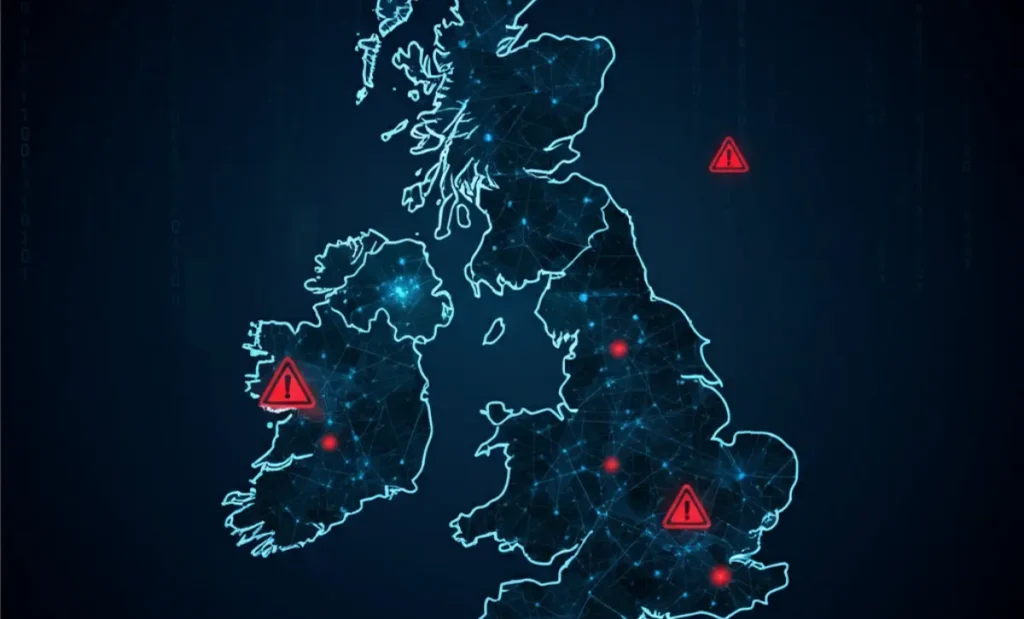Organisations across the UK are grappling with one of the most disruptive cyber attack waves in recent memory. Both public services and private businesses are reporting major interruptions, as criminals use a deadly mix of ransomware and sophisticated phishing tactics. As concerns about data breaches and cybersecurity continue to grow, experts are urging a united response.
Recent weeks have seen a sudden spike in digital threats hitting everything from local councils to NHS trusts. The National Cyber Security Centre (NCSC) has sounded the alarm, calling for immediate improvements in digital defences.
How Do These Cyber Attacks Work?
These latest cyber attacks usually start with highly believable phishing emails—messages designed to trick people into handing over passwords or clicking on harmful links. Once attackers gain a foothold, they often launch ransomware, locking critical files and demanding steep payments to unlock them.
One cybersecurity expert shared, “Attackers are now using a double blow: before they lock your data, they steal it too. That means the pressure is not just about restoring data, but also worrying it could be leaked.” This “double extortion” approach has made responding to incidents far more complicated.
Criminals aren’t just casting a wide net. Many are setting their sights directly on UK organisations, looking for known software weaknesses and, at times, exploiting brand-new (zero-day) vulnerabilities before they’re widely discovered.
Impact Across the UK: From Small Businesses to the NHS
The effects of this cyber attack crisis are being felt everywhere. Small and medium-sized businesses—often without large cybersecurity budgets—face the risk of grinding to a halt if targeted. Even a short outage can have a ripple effect lasting weeks.
Public service providers are also under pressure. Delays with council services, postponed appointments, and increased wait times across some NHS trusts have been reported. Although most organisations have backup plans, repeated hits put a huge strain on resources and can disrupt crucial services the public depends on.
Supply chains are another worry. A breach at a single company can quickly spread, slowing down deliveries and impacting other businesses and consumers across the country.
Data Breaches and Regulatory Duties
The danger isn’t just about business disruption—attacks increasingly involve the theft of sensitive data. If private or commercial information is stolen and threatened with exposure or sale, organisations can face serious legal trouble and heavy fines under the General Data Protection Regulation (GDPR).
The Information Commissioner’s Office (ICO) takes data protection seriously, and all data breaches must be reported quickly. Skirting these duties can have major financial and reputational consequences.
A regulatory advisor warns, “Protecting data goes beyond following the rules. Every business needs to show real commitment and effective security in action.”
UK Response and Investigations
The NCSC is already working alongside affected businesses and agencies, publishing updated cybersecurity guidance and rallying law enforcement, including Action Fraud, to trace the origins of the attack spree.
Tracking down the responsible cyber criminals is no small feat, since they’re skilled at concealing their tracks and using ever-changing tools. The authorities are investing resources to break the chain of attacks and protect British interests. As one government spokesperson put it, “We’re treating cybersecurity as a national priority.”
Practical Cybersecurity Tips for Everyone
While cyber threats are becoming more advanced, there’s still plenty individuals and businesses can do to reduce their risk.
Cybersecurity Tips for UK Businesses
- Multi-factor authentication: Enable MFA for all important accounts (especially email and remote working platforms) to add an extra layer of protection against unauthorised access.
- Stay up to date: Regularly patch and update all software, apps, and operating systems. Fixing security gaps as soon as possible is key for ransomware protection.
- Backup data often: Keep secure, offline backups and check them regularly. This helps you bounce back quickly from an attack without bowing to ransom demands.
- Phishing prevention: Train staff to spot phishing attempts and encourage reporting of suspicious emails. Human vigilance remains a business’s first and best defence.
- Incident planning: Make sure you have a clear plan of action if a cyber attack happens. Know who to contact and what steps to take to minimise fallout.
How UK Residents Can Stay Safe Online
- Question unexpected messages: If you get emails or texts you weren’t expecting, especially those urging quick action or sharing links, pause and double-check before responding.
- Use strong, unique passwords: Avoid reusing passwords across accounts. Consider a password manager to keep things secure.
- Always update devices: Install the latest updates for your phone, computer, and other connected tech as soon as they’re available.
Reporting a Cyber Attack in the UK
If you suspect a cyber attack, act quickly. Businesses should reach out to the NCSC, while UK individuals or organisations can report suspected cybercrime and fraud to Action Fraud. You can submit a report and find guidance at the official Action Fraud website. Your report can help prevent further damage and strengthen the country’s overall resilience to future security threats.If you suspect a cyber attack, act quickly. Businesses should reach out to the NCSC, while UK individuals or organisations can report suspected cybercrime and fraud to Action Fraud. Your report can help prevent further damage and strengthen the country’s overall resilience to future security threats.
You may also read : Oxford Union at the Centre of New Debate on Free Speech and Invite Policy
You may visit our official website : nbanews

